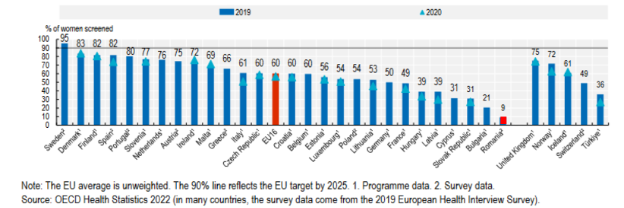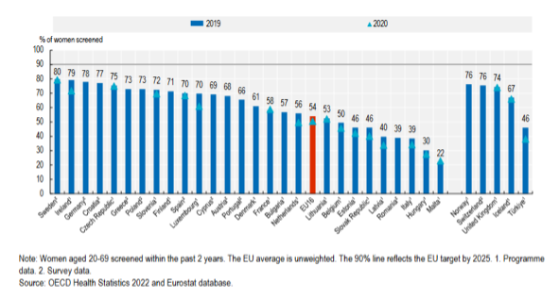”Female Oncologic Diseases” study represents a broad mobilization to “diagnose” the existing problems of the medical system in Romania in connection with three types of cancer affecting women: breast, cervical and ovarian.
The research includes both qualitative and quantitative methods, to create a picture as complete and detailed as possible and at the same time a detailed one for the issue in question. This study includes three categories of respondents: doctors involved in the screening process; healthy women, who could participate in screening programmes; and patients diagnosed with one of three types of cancer and their dependents, respectively.
In 2020, Romania ranks the last in Europe in terms of the percentage of the female population that has undergone a breast check-up at least once in their lifetime (the European average was 60% and Romania had 9% – the lowest rate among all participating countries)1

The INSP Report2 regarding cervical cancer in Romania as per 2020, shows that the percentage of women over 15 years of age who received a screening test for cervical cancer was 30%, compared to the EU average of 59.5%

The situation of the main cancers affecting women – breast and cervical cancer – illustrate very well the effects of solutions applied to problems which were not understood sufficiently well.
Cancer prevention involves several stages:
- Primary prevention aims to reduce the incidence of cancer by eliminating the main risk factors, such as smoking, nutrition and poor physical activity.
- Secondary prevention aims to reduce cancer mortality, through early detection thereof, when chances of successful treatment are high.
The best method for early detection is screening the entire population.
Although the absence of a national breast screening programme largely explains the very low presence of Romanian women at the screening check-ups, this cannot be the only reason, evidence being the fact that the two other European countries that also have no national screening programme, have a much higher rate of visits to the doctor.
When asked about the reason why they came for screening-type check-ups for breast cancer, many women invoked “other reasons”, as financial and geographical barriers.
In order change this situation, “Renaşterea” Foundation is conducting since 2007 an opportunistic screening programme “Mobile diagnosis for breast cancer and cervical cancer”, for women living in small towns and rural areas.
Since the start of this campaign, Renaşterea’s Mobile Diagnosis Unit visited 71 localities from all over the country, where over 34.000 investigations (mammograms and Pap smear tests) were conducted. The National Health Ministry announced during the press conference organized by “Renaşterea” Foundation in May, 30, that the National Screening Programme for Breast cancer will be launched by the end of 2024.
Author: Andrei Rachieru, Project Manager Renasterea Foundation

